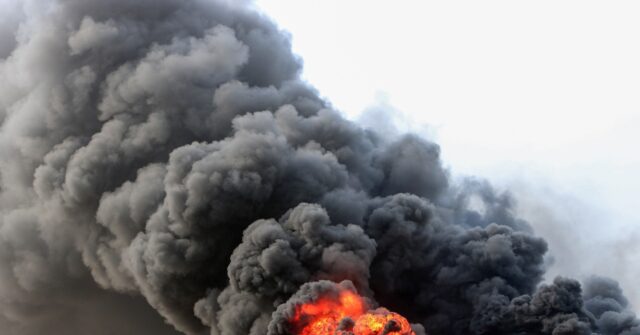The Israeli strike on Yemen’s port of Hodeida has released hazardous emissions and caused fuel spills, experts said, compounding environmental pollution already worsened by oil spills from Huthi ship attacks.
The strikes on Saturday, the first claimed by Israel on Yemen, hit fuel storage tanks in the main port under the control of the Iran-backed rebels, triggering an inferno.
Parts of the port were still ablaze early on Wednesday, after an oil tank exploded overnight, according to local authorities. Images from the harbour showed a thick plume of black smoke billowing into the air.
The Conflict and Environment Observatory (CEOBS), a UK charity that monitors the environmental impact of conflict, said: “The fire and associated spills will have generated hazardous emissions to the air and substantial ground contamination with pollution to the marine environment likely.”
Yemen was already suffering from serious air and water pollution, a report published by the UN’s migration office in March warned, after nearly a decade of war between the Iran-backed Huthis and the internationally recognised government propped up by Saudi Arabia.
The attack, which Israel said was in retaliation for the first fatal Huthi strike on Tel Aviv, resulted in “a large oil spill from the burning fuel tanks into the sea,” said Mwatana for Human Rights, a Yemeni rights group which dispatched an assessment team to the dock.
This “could cause significant environmental pollution in the marine environment as the leak is still ongoing,” the group said in a statement to AFP, warning that its impact could be “widespread due to the large quantities of fuel that were stored.”
‘Localised spills’
Wim Zwijnenburg of Dutch peace-building group PAX reported at least tens of thousands of litres of oil burning in the aftermath of the attack, warning that the “noxious fumes” posed serious health risks.
Analysing recent satellite imagery captured by the European Space Agency’s Sentinel-2, he said the Israeli strikes caused “localised spills into the harbour marine environment and on the premises” and destroyed most of the port’s oil storage capacity.
“Faced with conflict and climate crisis impacts, civilians and the environment in Yemen are bearing the brunt of ongoing hostilities,” Zwijnenburg told AFP.
Yemen’s waters are home to a rich marine ecosystem, including coral reefs, while many coastal communities in the Arabian Peninsula’s poorest country are reliant on fishing.
Farah Al Hattab of Greenpeace Middle East said coastal pollution from the strikes on the Hodeida port “potentially affects millions of people whose livelihood depends on fishing.”
“Fishing was Yemen’s second largest export and it continues to provide a source of income and food security,” she told AFP.
A spate of drone and missile strikes by the Huthis on vessels in the Red Sea and the Gulf of Aden since November, linked to the Gaza war, have turned Yemen’s waters into a hotspot for pollution.
Last week, a Liberia-flagged oil tanker was apparently leaking fuel in the Red Sea after it was hit by a Huthi strike 97 nautical miles northwest of Hodeida, according to NGOs and maritime security agencies.
A large oil slick, initially measuring 220 kilometres (135 miles) long, was spotted near the site of the strike, threatening the Farasan marine sanctuary off the coast of Yemen and Saudi Arabia, according to CEOBS.
The charity estimated the size of the spill to be at least 500 barrels (79,000 litres).
The slick was still visible six days after the attack, CEOBS said on Monday, adding that its “persistence indicates environmental risks to corals and marine ecosystems”.
Chemical pollutants
The ship strike came months after another vessel hit by the Huthis sank with 21,000 tonnes of ammonium phosphate sulphate fertiliser on board after already leaving a slick from leaking fuel while it was still afloat.
The sinking in March of the Belize-flagged, Lebanese-operated Rubymar, a bulk cargo carrier, triggered concerns that leaking fuel and chemical pollutants could spill into the Red Sea and harm coral reefs and marine life.
The recurring incidents undermine international efforts to avoid an environmental catastrophe off Yemen after years of war.
Last year, the United Nations said it successfully completed the transfer of oil from the FSO Safer supertanker off Yemen’s Red Sea coast, preventing the immediate threat of a massive spill.
The Safer, a 48-year-old ship with a corroding hull, was for years described as a “ticking time bomb”. The ship, used for storing and exporting oil, had gone unserviced due to the war in Yemen and there were fears that a leak or on-board explosion could have released its cargo of more than a million barrels of crude oil into the Red Sea.








